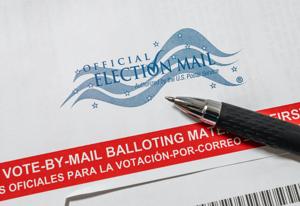Group petitions Supreme Court to strike down Indiana’s absentee voting laws

(The Center Square) – The 2020 election is over and it seems at least some people believe voting by mail is a problem.
There were chain of custody of ballot complaints, along with others including verification of whether ballots were cast by eligible voters after they were separated from envelopes.
But in Indiana, a nonprofit group is pressing ahead with its push for the state to go to no-excuse absentee voting, and has petitioned the U.S. Supreme Court to take up its case filed last year alleging that Indiana’s absentee voting laws are discriminatory.
Indiana Vote by Mail, the nonprofit group, alleged in a suit filed in federal court last spring that the Indiana law that says people 65 and up can vote absentee discriminates against younger people, thus violating the 26th Amendment to the U.S. Constitution.
They also alleged requiring people to vote in person, and not allowing them to vote at home if they didn’t have one of the 11 excuses allowed in law for voting absentee, violated their right to vote during the COVID-19 pandemic.
They asked for an injunction – for the court to intervene to allow everyone in the state to vote absentee, with no excuse needed.
They didn’t get it.
Judge Michael Stephen Kanne, writing for the 7th Circuit Court of Appeals, said the fundamental right to vote does not extend to a “claimed right” to cast an absentee ballot by mail, citing the Supreme Court’s decision in McDonald v. Board of Election Commissioners of Chicago.
Indiana’s absentee voting system, he wrote, “does not affect Plaintiffs’ right to vote and does not violate the Constitution. In the upcoming election, all Hoosiers, including Plaintiffs, can vote on election day, or during the early-voting period, at polling places all over Indiana. The court recognizes the difficulties that might accompany in-person voting during this time. But Indiana’s absentee-voting laws are not to blame. It’s the pandemic, not the State, that might affect Plaintiff’s determination to cast a ballot.”
Indiana’s Republican governor, Eric Holcomb, issued an executive order in March of 2020, changing the date of the state’s primary election from May 5 to June 2, and allowing all voters to vote by mail, because of the pandemic.
But he declined to do the same for the general election Nov. 3, and the four-member Indiana Election Commission deadlocked on loosening restrictions on absentee voting, making Indiana one of just a handful of states that did not change its laws and allow everyone to vote by mail in November.
In the appeals court’s October opinion, Kanne also reiterated the primacy of the state’s role in elections, writing that the Constitution “explicitly grants states the authority to prescribe the manner of holding federal elections” and saying that in light of this, the court “has acknowledged that balancing the interests of discouraging fraud and mitigating elections-related issues with encouraging voter turnout is a judgement reserved to the legislature.”
The Indiana Senate recently passed a law that would prevent the governor, secretary of state, or the Indiana Election Commission from ever again changing the “time, place or manner” of an election – making it explicit that only the state legislature could ever in future postpone an election, or change laws regarding absentee voting or anything else.
Logan Churchwell of the Public Interest Legal Foundation says there’s a very good reason to not allow election laws to be altered by anyone besides a state legislature.
“When we look at state election laws as they relate to mail voting, we have to understand that these laws didn’t just appear out of nowhere,” he said. “A lot of this legislation is based on trial and error and troubleshooting experience shared between election officials to legislators.”
The foundation, which is based in Indianapolis, has gone to court numerous times to force states to remove ineligible voters from their rolls. Last October, the organization released a report called Critical Condition, in which it reported that there are 349,773 dead people on voter rolls across 41 states, with 7,890 ballots cast in the names of those deceased voters in 2016. The report also found that 43,760 duplicate registrants cast votes from the same address in 2016, many of them by mail.
Indiana was not one of the states in the study, as state law does not allow Indiana to release birth dates of voters in public records requests.
The president of Indiana Vote by Mail is Barbara Tully, a voter in Marion County (Indianapolis).
Indiana Vote by Mail, she says, wants Indiana to allow everyone to vote by mail, for any reason.
“We’re saying, take away the excuses,” she said. “Our argument is why make us tell you why I can’t show up at the polls on Election Day?”
She says she and the other members of Indiana Vote by Mail vigorously support signature-matching on absentee ballot envelopes as a way of verifying that the ballot was cast by the voter, and also support rigorous maintenance of voter rolls, so that they accurately reflect who is eligible to vote in the state.
“We’re about as grassroots as you can get,” she says of Indiana Vote by Mail. But the legal suits are being done pro bono, she says, with the law firm, Mayer Brown LLP of Washington, DC, not charging a dime to take the case to federal court, through an appeals process and now to the Supreme Court.
Tully and eight other Indiana voters are named as petitioners in the suit. The respondents are Secretary of State Connie Lawson and the four members of the Indiana Election Commission.
Disclaimer: This content is distributed by The Center Square
